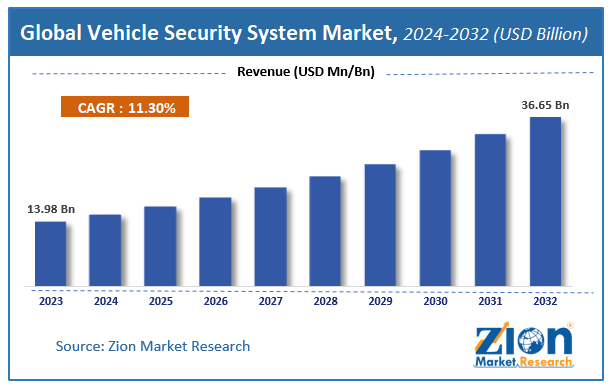Understanding Vehicle Security Systems
A vehicle security system is designed to protect vehicles from theft and unauthorized access. These systems include various components such as alarms, immobilizers, keyless entry systems, central locking, and advanced technologies like GPS tracking and biometric authentication.
Modern vehicle security systems are often integrated with telematics, enabling real-time data exchange, remote access, and enhanced monitoring. These innovations are not only improving security but also providing a more personalized and convenient experience for vehicle owners.
Vehicle Security System Market Size
According to forecasts, the global vehicle security systems market will be worth USD 13.98 billion in 2023 and USD 36.65 billion in 2032. For the years 2024–2032, analysts predict that the market will develop at a CAGR of 11.3%.

Key Trends Driving the Market Growth
Several factors are contributing to the expansion of the global vehicle security system market. Let’s explore the most prominent trends:
a) Increasing Vehicle Theft Rates
The rise in vehicle theft rates across various regions has created a strong demand for advanced security solutions. Many governments are implementing stringent regulations that require automotive manufacturers to include anti-theft features in their vehicles. This is driving investments in more sophisticated and foolproof systems.
b) Technological Advancements
The shift towards electric vehicles (EVs) and connected cars has accelerated the adoption of advanced vehicle security systems. The integration of Artificial Intelligence (AI), Machine Learning (ML), and the Internet of Things (IoT) in automotive security offers real-time monitoring, predictive analytics, and enhanced security protocols. Features like facial recognition, biometric access, and voice command systems are becoming more common in high-end models.
c) Growing Demand for Electric Vehicles
The growing adoption of EVs has brought new challenges to vehicle security. Electric vehicles are more software-driven, making them susceptible to hacking. As a result, EV manufacturers are investing in cybersecurity solutions that can protect vehicle software and data, in addition to traditional anti-theft systems.
d) Rising Consumer Awareness
As consumers become more aware of vehicle theft risks and advanced safety technologies, they are actively seeking vehicles equipped with better security features. The convenience of smart security systems, such as keyless entry, remote locking, and tracking, is driving consumer preference for vehicles with comprehensive safety solutions.
e) Government Regulations and Industry Standards
Governments around the world are increasingly imposing regulations that mandate vehicle manufacturers to install anti-theft devices in all vehicles. The regulatory push is encouraging manufacturers to adopt higher standards and ensure that their products meet the evolving security demands of the market.
Download Free Sample: https://www.zionmarketresearch.com/sample/vehicle-security-system-market
Challenges in the Vehicle Security System Market
Despite significant advancements, the vehicle security system market faces several challenges:
a) High Installation and Maintenance Costs
One of the main barriers to market growth is the high cost associated with installing advanced security systems. Some technologies, like biometric authentication and advanced GPS tracking, are expensive and require continuous updates and maintenance.
b) Cybersecurity Threats
As vehicles become increasingly connected, they also become vulnerable to cyberattacks. Hackers can target the software and communication systems within connected vehicles, posing a new set of security risks. Automotive manufacturers and security providers must continuously innovate to protect these systems from cyber threats.
c) Complex Integration of Advanced Technologies
The integration of AI, IoT, and telematics into vehicle security requires a complex network of systems that can seamlessly interact. Ensuring compatibility, functionality, and durability across various platforms can be challenging for manufacturers.
Opportunities for Growth in the Vehicle Security System Market
Despite the challenges, there are numerous opportunities for growth in the vehicle security system market:
a) Rise in Smart Cars and Autonomous Vehicles
The increasing development of smart cars and autonomous vehicles will drive demand for more sophisticated vehicle security systems. These vehicles require enhanced safety features such as collision prevention, remote monitoring, and real-time security alerts.
b) Integration with Telematics and Fleet Management
Telematics and fleet management systems are offering new opportunities for vehicle security by providing real-time location tracking, driver behavior monitoring, and remote access control. Businesses managing fleets can benefit from reduced vehicle theft, lower insurance premiums, and improved operational efficiency.
c) Emerging Markets
The rising vehicle ownership in emerging markets, particularly in Asia-Pacific, Latin America, and parts of Africa, presents significant growth opportunities. As economies grow, more consumers are buying vehicles and seeking security systems to protect their investments.
d) Adoption of Blockchain for Vehicle Security
Blockchain technology is gaining attention in vehicle security for its ability to provide a decentralized, secure, and transparent way of managing data. With blockchain, it’s possible to prevent data tampering and improve the overall security of connected vehicles.
Market Outlook: What to Expect by 2032
Looking ahead to 2032, several factors are expected to shape the global vehicle security system market:
- Increasing Adoption of AI and IoT: Artificial Intelligence and the Internet of Things will continue to play a critical role in shaping the future of vehicle security. These technologies will enable predictive maintenance, real-time threat detection, and continuous monitoring.
- Electric Vehicles to Lead the Market: The EV segment is expected to lead in adopting advanced security technologies. With the growth in electric vehicle sales, manufacturers will focus on developing security systems that can address both physical and cyber threats.
- Customization and Personalization: Consumers will demand more customizable and personalized security solutions, which can be tailored to their preferences. This includes features like biometric authentication and AI-powered systems that learn the behavior of vehicle owners.
- Global Expansion: With growing demand in emerging economies, global manufacturers are expected to expand their product lines and services to cater to different market segments. The rise in vehicle ownership and disposable income in these regions will drive market growth.
Conclusion
The global vehicle security system market is poised for substantial growth through 2032, driven by advancements in technology, growing concerns over vehicle theft, and the rise of connected and electric vehicles. As manufacturers continue to innovate and governments enforce stricter regulations, the market will experience a surge in demand for sophisticated and intelligent security solutions.
While challenges such as high costs and cybersecurity threats remain, the opportunities for innovation and growth in the vehicle security system industry are significant. The future of vehicle security will be shaped by the convergence of AI, IoT, telematics, and blockchain technologies, making cars safer, smarter, and more secure than ever before.

